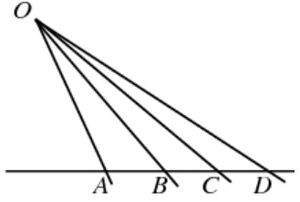Pencil (mathematics) (nonfiction)
In projective geometry, a pencil is a family of geometric objects with a common property, for example the set of lines that pass through a given point in a projective plane.
In affine geometry with the reflexive variant of parallelism, a set of parallel lines forms an equivalence class called a pencil of parallel lines.
More generally, a pencil is the special case of a linear system of divisors in which the parameter space is a projective line.
A pencil of planes, the family of planes through a given straight line, is sometimes referred to as a fan or a sheaf.
The word "pencil" is an English translation of the French phrase ordonnance de lignes ("order of lines"), coined by Girard Desargues in his Brouillon Projet d'une atteinte aux événements des rencontres du Cône avec un Plan ("Rough Draft of an Attempt to Deal with the Outcome of a Meeting of a Cone with a Plane") which appeared in Paris in 1639.
The original meaning of the English word “pencil” is a fine brush; this is also the meaning of French pinceau (as opposed to French "crayon" = English "pencil"). According to the Oxford English Dictionary the earliest English attestation of "pencil" in its mathematical sense is in a book from as late as 1840. The underlying image is evidently that of lines converging at a single point in the same way that the fine strands on a small pointed brush converge at the tip.
Fiction cross-reference
Nonfiction cross-reference
External links:
